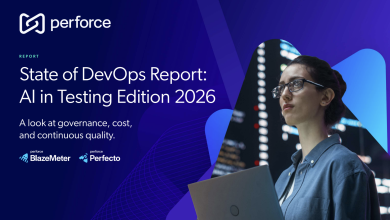
The technological revolution is upon us; generative AI is here. With the launch of ChatGPT and rivals like Google Bard, Bloom and Alibaba’s Tongyi Qianwen, the technology landscape has been forever changed.
Generative AI has opened the door to a world of new enterprise possibilities – from product development, customer experience, talent, and knowledge to values and ethics. But we’re only scratching the surface when it comes to exploring and understanding the potential of this intelligence.
Hand in hand with any technological advancement comes the potential for danger, with fears growing around generative AI being trained and used for unethical practices. And whilst it’s safe to say a robotic takeover will stay on the screens of science fiction films, there are real concerns about how it can be misused – with even OpenAI, ChatGPT’s creators, calling for international regulation of the technology.
For businesses, the challenge now is learning how to navigate this new and exciting landscape, whilst paving the way for ethical and responsible implementation. As quoted in superhero fantasy, “With great power comes great responsibility”.
Plugging the gaps in business knowledge
No matter the headlines, AI won’t be the ‘end all’ to humanity, nor will it replace the human workforce. If anything, it will help to enhance it – bridging together the gaps in our human knowledge.
Currently, industries across the board are facing shortages of skilled workers, both in terms of recruiting new talent, but also in retaining existing talent. This lack of skilled workers sends a shockwave through the entire industry with vital expertise being lost – making it difficult to produce subject matter experts. This is where generative AI comes into play. As this technology develops, it will streamline work and ensure organizational knowledge is easily stored and accessible.
By utilizing generative AI tools, industries can start to plug the gaps in accumulated knowledge, meaning expertise and ‘tricks of the trade’ can still be stored, even if talent leaves. Once operational, businesses can start to search for industry knowledge and answers in a similar way that they would look for something on a Google search.
Organizations can then point their employees to their own company ‘knowledgebase’, allowing staff to access and extract relevant information when they need it. Whether that’s information on the company’s history, how they should be setting appropriate KPIs, or even the best way to push out a particular product or service, GPT technologies will help to protect and restore vital company and industry knowledge.
Transforming CX at scale
Having only launched in late 2022, ChatGPT and other similar technologies are already streamlining business timescales when it comes to launching new products or services. However, it will prove particularly game-changing for service-oriented, contact-focused industries, like banks, retailers, and healthcare firms.
Many of us are familiar with chatbots, but they are nowhere near the realistic mimicking of human conversation that these new models offer in the delivery of instant and accurate customer support. For example, using ChatGPT, organizations can provide a ‘next best action’ for consumers with a fluidity not experienced before. This next best action can be determined and personalized through synthetic customer testing. Companies can trial and test conversations with a vast range of consumer profiles and construct various plausible solutions.
Achieving this at scale requires large language models which can be tested efficiently and effectively in a virtual space, identifying customers based on all the interactions you have had, to achieve said hyper-personalisation. This is the next level of customer experience, where AI can respond appropriately to a plethora of real-world reactions.
This is especially relevant when it comes to ensuring that AI supports a diverse world, with an approach that helps maintain trust and transparency. Any organization engaging in AI should have clear policies to ensure its implementation is ethical. For example, businesses must have diverse teams to avoid transferring human bias into the technical design of AI – as the AI is driven by human input.
Companies should also refrain from using outdated data because these algorithms will only amplify past patterns and not design new ones for the future. For example, this was highlighted by the OpenAI Dall.E2 model, which, when asked to paint pictures of startup CEOs, all were male.
Ethics at the forefront of all AI approaches
For all of generative AI’s many benefits to business, we can’t ignore the potential dangers. For companies looking to leverage this technology, they must ensure they are across all perceived and potential risks, right from the implementation stage.
When implementing AI models, responsibility should be at the forefront of the enterprise, with trust at the center of any approach. This means ensuring AI models that run without bias, treat consumers and employees fairly, safeguard customers’ personal information, and comply with all legal and regulatory environments. Then comes business accountability and explainability for the model’s decisions, followed by inclusivity and societal benefit.
Generative AI has massive potential in work and beyond – enabling greater access to knowledge, streamlining operations, and helping businesses extract the most value from products and services. As it develops, we may even see it used as our ‘personal AI’, understanding what we want and what options are available across numerous areas, from offering personalized financial advice to helping address workplace challenges.
As it stands, we are only at the tip of the iceberg when it comes to exploring and utilizing this technology to its fullest potential – but for now, those businesses that tap into this technology and do so ethically will ultimately see the biggest business benefits.



